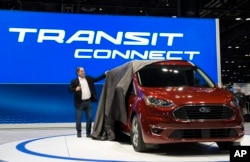A key to any successful business is to provide customers with what they want. For automakers at the 2018 Chicago Auto Show, they say their customers want sport utility vehicles, or SUVs.
"2017 was a record year for Ford SUV sales," said Dan Jones, Ford's SUV communications manager for North America. "We sold almost 800,000 SUVs in the year alone. We are actually growing our SUV portfolio 25 percent in the last four years. So, all the signs are there that the Ford SUV portfolio is really booming, and we're going to capitalize and ride that wave."
Ford isn't alone.
"Trucks, SUVs and crossovers — we have grown 15 percent," said Tiago Castro, Nissan's director of trucks and commercial vehicles.
His company's Rogue SUV promotional tie-in with Disney's Star Wars film franchise comes at a time when the model, with versions equipped with some self-driving features, is one of Nissan's best-selling vehicles overall.
"Over 400,000 units last year for the Rogue lineup," Castro said.
High gas prices and poor fuel economy contributed to the dramatic decline of SUV sales in the United States in the mid-2000s. At the time, those customers buying new vehicles opted for smaller, more fuel-efficient sedans, including vehicles with new electric motors and technology.
But today, SUVs dominate the American automobile market, which is easy to see on the floor of the 2018 Chicago Auto Show, billed as the nation's largest auto show.
"The SUV segment is incredibly hot," said Trevor Dorchies, product manager for Jeep and Dodge, two brands under the Chrysler/Fiat company with a variety of options in the medium and large-size SUV ranges — which weren't just on display at the Chicago Auto Show. Potential customers have an opportunity to ride in them on an indoor obstacle course that demonstrates their performance in challenging terrain.
"I think gas prices, where they are at right now, have helped Jeep and Grand Cherokee and Durango sales," Dorchies said. Gas prices in many parts of the United States remain below $3 a gallon (79 U.S. cents per liter).
"Cheap gasoline means folks want to get a bigger SUV," he said.
But aside from affordable fuel prices, today's offerings are a far cry from the gas-guzzling SUVs of the past.
"One thing that has really changed in the last few years is the competitiveness of fuel economy of SUVs compared to cars," explained Ford's Jones. "So, people aren't seeing a huge warp now, in terms of MPG improvement or a range improvement in a car to an SUV. It's less of a compromise. So, people are liking the high seating position, more space, the utility to go off road."
Overall, sedan sales are down in the U.S. by more than 30 percent for some manufacturers as customers flock to SUVs.
But Jones said evolving needs and taste factor as much for customers as gas prices.
"The millennials, the biggest cohort of consumers, were coming to the age where they were having children, starting to have a little more money, wanting to have a higher seating position, preferring all-wheel drive. So, SUVs have really just taken off."
Jones said he doesn't see the SUV trend cooling off for Ford either.
"We think 2018 should be another record year for us," he said.
While automakers retool and shift production lines to keep up with increased SUV demand, the National Automobile Dealers Association predicts overall new vehicle sales for 2018 will trend slightly downward.







